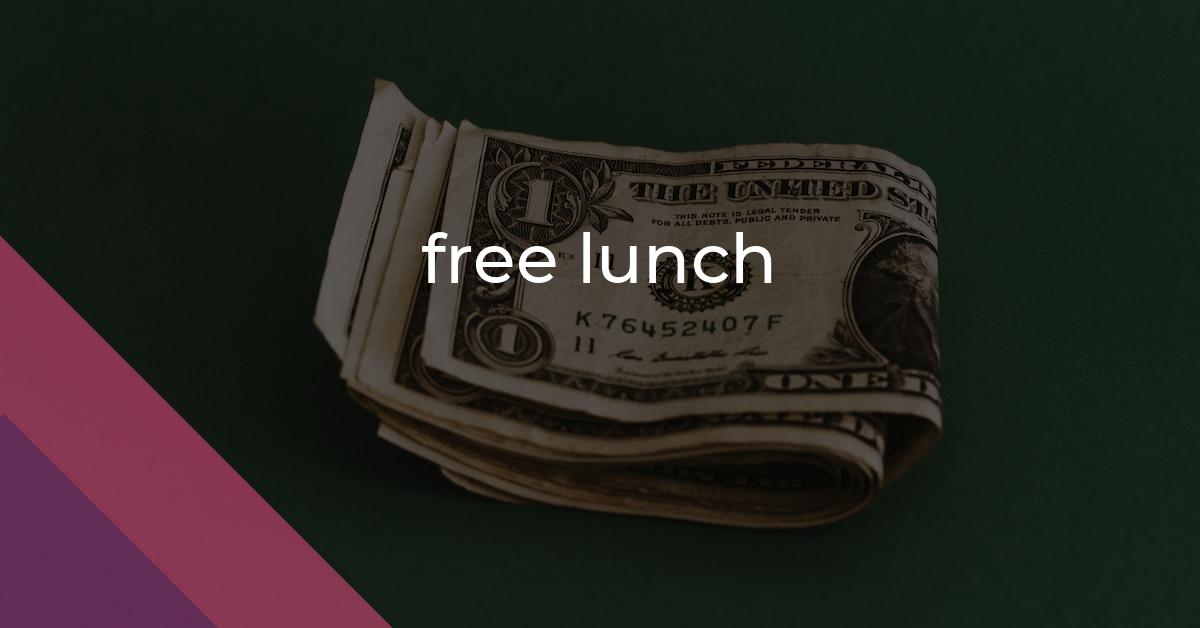free lunch: Idiom Meaning and Origin
What does ‘free lunch’ mean?
The idiom "free lunch" refers to something that appears to be given at no cost, but actually comes with hidden or future expenses. It highlights the concept that nothing is truly free and often implies that there is a catch or a trade-off involved.

Idiom Explorer
The idiom "in for a penny, in for a pound" means that once you commit to doing something, you might as well fully commit and go all the way, regardless of the cost or consequences.
The idiom "hit the jackpot" means to achieve a great success or obtain an unexpected, significant gain, often in a financial sense.
The idiom "high-stakes" refers to a situation in which there is a significant potential gain or loss, usually involving a lot of money or important consequences.
The idiom "hell to pay" means to face severe consequences or trouble for one's actions or decisions.
The idiom "good value" refers to something that is worth the money spent on it, providing a high quality or benefit relative to its cost.
The idiom "golden ticket" means an unmissable opportunity or a pass to something special or exclusive, often with great rewards or advantages.
An idiom that describes a situation where something unexpectedly turns out to be successful or advantageous, despite initial expectations. The outcome is usually positive, but may also involve a degree of unpredictability or chaos.
The idiom "give the game away" means to reveal or expose a secret or hidden truth, usually unintentionally, thereby spoiling a surprise, plan, or strategy.
The idiom "get out of jail free card" means a valuable resource or opportunity that allows someone to avoid negative consequences or escape a difficult situation, similar to the game of Monopoly where this card allows a player to be released from jail without penalty.
The idiom "get away with" means to do something wrong or illegal without being caught or punished.
Unveiling Lunch's Hidden Cost
The idiom "free lunch" is often used to describe something that appears to be free but actually comes with a hidden cost or catch. It serves as a reminder to approach things with skepticism and to consider the potential hidden costs.
One of the earliest known uses of the idiom is attributed to American writer and humorist Henry Wheeler Shaw, better known by his pen name Josh Billings. In his book "Everybody's Friend, or; Josh Billing's Encyclopedia and Proverbial Philosophy of Wit and Humor" published in 1874, he wrote, "Be ware of enterprises that require new clothes, and not rather a new wearer of clothes. If there is not a new man... it does not appear but what what he will prefer cloth-heels to cotton and a long bill to a free lunch."
The phrase was later popularized by American economist Milton Friedman in his book "Capitalism and Freedom" published in 1962. He used it as the title of one of the chapters, which discussed how there is no such thing as a truly "free lunch" in economics, as every expenditure has a cost and someone ultimately pays for it.
The origins of the idiom can be traced back to the practice of saloons in the late 19th century, where they would offer a free lunch to attract customers. However, the "free lunch" wasn't really free, as it was expected that patrons would buy drinks while enjoying the complimentary food. This led to the saying, "There ain't no such thing as a free lunch."
The idiom gained further popularity in the 20th century and is still commonly used today to convey the idea that nothing is truly free, and there is always a cost or consequence associated with seemingly free offers or opportunities.
While the idiom "free lunch" primarily focuses on hidden costs, there are related idioms that further enhance the concept of a seemingly free offer or opportunity. These idioms include "free ride," "fool's bargain," and "catch a break."
The idiom "free ride" is often used to describe a situation where someone benefits or gains an advantage without having to work for or contribute to it. It conveys the idea that someone is getting something for free or at no cost to them.
A "fool's bargain" refers to a deal or agreement that initially appears to be favorable but ultimately proves to be disadvantageous or deceptive. It suggests that someone has been tricked or taken advantage of in a transaction or arrangement.
To "catch a break" means to finally encounter a stroke of luck or to have things go in one's favor after a period of difficulty or misfortune. It implies that someone has been given an opportunity or advantage amid challenging circumstances.
When considering the concept of a "free lunch," these related idioms further emphasize the idea that nothing is truly free or without consequences. They highlight the potential pitfalls or hidden costs that may come with seemingly advantageous situations.
It's important to remember that these idioms are not just catchy phrases, but they reflect the realities of life. In economics, the concept of opportunity cost aligns with the idea that when you choose one thing, you are giving up the opportunity to choose something else.
So the next time you come across a seemingly free offer or opportunity, keep in mind the idiom "free lunch" and its related phrases. Consider the potential hidden costs, think twice before making a decision, and remember that there's no such thing as a truly "free ride," a fool's bargain can turn out to be costly, and sometimes, all you need is to "catch a break."
Overall, the idiom "free lunch" reminds us to be skeptical of seemingly free offers or opportunities. It originated from the practice of saloons offering complimentary food to attract customers, but with the expectation that people would buy drinks. It has since evolved to become a widely used phrase to convey the concept that there are no true "free lunches" in life, and everything comes with a cost or catch. So, whether it's a "free ride," a "fool's bargain," or the need to "catch a break," always approach things with caution and be mindful of the potential hidden costs.
Example usage
Examples of how the idiom "free lunch" can be used in a sentence are:
- Don't be fooled by the free lunch they are offering; there's always a hidden catch.
- There's no such thing as a free lunch, so be prepared to pay for any extra services.
- I attended a conference where they provided a free lunch for all the participants.
More "Nouns" idioms



